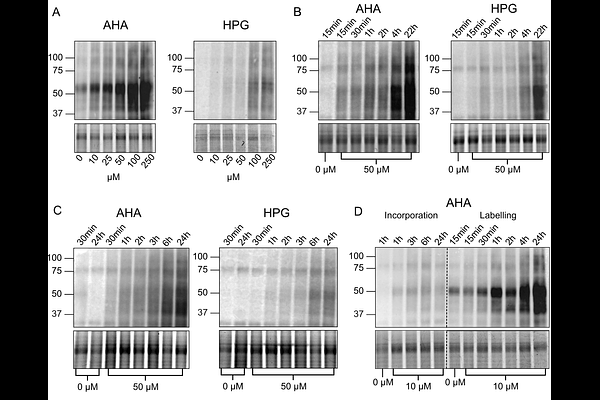Optimization of Bio-Orthogonal Non-Canonical Amino acid Tagging (BONCAT) for effective low-disruption labelling of Arabidopsis proteins in vivo

Optimization of Bio-Orthogonal Non-Canonical Amino acid Tagging (BONCAT) for effective low-disruption labelling of Arabidopsis proteins in vivo
Hassan, N.; Braun, S.; Talasila, M.; Fahlman, R.; Uhrig, R. G.
AbstractPlants, as sessile organisms, require robust responses in protein synthesis to adapt to variable environmental conditions. Measurement of newly synthesized proteins has been successfully facilitated with Bio-Orthogonal Non-Canonical Amino acid Tagging (BONCAT) across a multitude of organisms. Here, we use non-canonical amino acids (NCAAs) L-azidohomoalanine (AHA) or L-homopropargylglycine (HPG) incorporation in place of methionine residues into the actively translating Arabidopsis proteome, allowing for that subset of proteins to be enriched for mass spectrometry quantification. Although this technique has seen occasional use in plants, optimization of the protocol to maximize functionality while minimizing organismal stress has not yet been established. Here, we provide evidence for successful implementation through the liquid immersion of seedlings in AHA or HPG-containing media that functions with significantly lower concentrations than the literature standard. Our approach splits acute exposure and incorporation phase of labelling to mitigate potential negative impacts of prolonged NCAA exposure without compromising effective enrichment capacity, and demonstrate that this results in an unperturbed growth phenotype for AHA-treated seedlings. Finally, we demonstrate the capacity of this modified approach to enrich newly synthesized proteins from the whole proteome under standard stress conditions. These improvements allow for a broader use of BONCAT technologies in molecular plant research, affording a deeper understanding of the newly synthesized proteome without negatively impacting plant health.